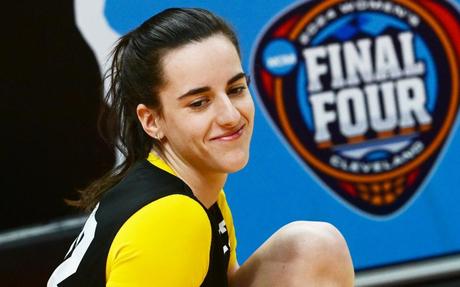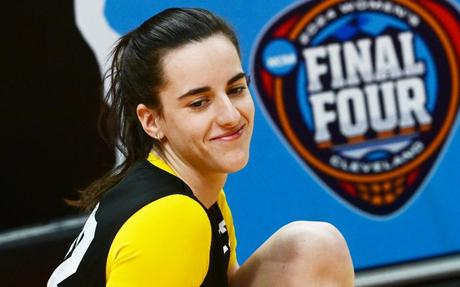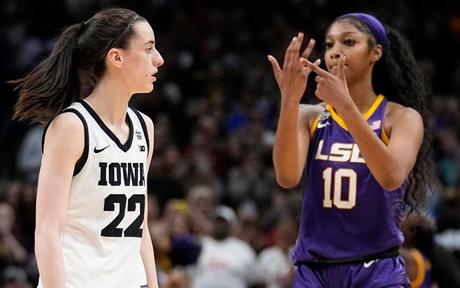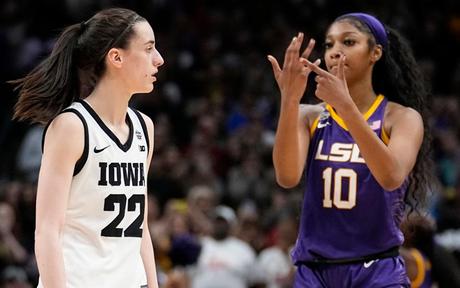Last weekend's Saturday Night Live opened with a parody of a sports broadcast. Kenan Thompson, who played Charles Barkley, was asked what he thought of the previous night's men's NCAA [National Collegiate Athletic Association] semi finals.
"Can I be real with you?" said Thompson. "I didn't look at it."
Expert Kenny Smith (Devon Walker): "Me neither. You know, it's just hard to get excited when there are better games on the market."
Host Ernie Johnson (James Austin Johnson): "You mean the NBA?"
Smith: "No, the women's tournament."
Cue shouts and jeers from the studio audience.
SNL, like much of America, has generally taken shots at the women's basketball level, but the current push is so great that men have become a punchline. Just as telling, the women's college tournament is mainstream enough to open a TV Institute episode with a skit. A lot of this is thanks to Caitlin Clark.


"My Uber driver, an old man, was talking about the finals of the women's tournament yesterday," said women's basketball expert Khristina Williams. "It happens, it's leading news hours on sports shows. She attracts both sports enthusiasts and casual fans."
The noise around the 6-foot-1 point guard is becoming hard to ignore, but so are her numbers. She broke Pete Maravich's 54-year record in college basketball, long considered unattainable. She scored the most three-pointers ever in one season. When her Iowa Hawkeyes faced the South Carolina Gamecocks in the NCAA March Madness finals on Sunday, they drew a record 18.7 million TV viewers, more than any individual night during the NBA Finals or the baseball World Series. last year.
Commercial deals followed: insurers State Farm, Gatorade, Buick and an Iowan supermarket chain teamed with her to launch Caitlin's Crunch Time, a limited-edition breakfast cereal. Still, there was no fairytale ending to her college career, with Iowa losing to the undefeated Gamecocks in its final game before the WNBA draft next week.
The story continues
This won't diminish enthusiasm for Clark. She is the first pick by the Indiana Fever, where ticket sales for the season have already increased in anticipation of her arrival. Mostly people want to see her shooting, or rather the distance she shoots from. "Oh my," ESPN commentator Ryan Ruocco said during Sunday's finale. "From the future!"
Like Steph Curry, who revolutionized the men's game and forced the sport as a whole to prioritize three-pointers, Clark's accuracy from deep has expanded what's possible. The 'logo three' - a close-up shot of the emblems decorating the center circle - has become a trademark.
"The logo threes are built for our media infrastructure," says women's basketball journalist Jackie Powell. "It's perfect for TikToks and Instagram Reels. She also throws these zinger-like passes, these rockets, and that's very attractive to people as well."
Williams added, "It's about how she plays the game, the pace she plays at and how she can move the Iowa offense. You really don't see many WNBA offenses in the way she can dictate with her playmaking ability. Overall, it is her competitiveness and her work ethic that sets her apart."
But hard work and good shooting aren't enough to capture the imagination to the extent that Clark has. She also reframes expectations for female athletes. She was punished for saying "damn" to herself after missing a shot in January 2023, when male players often used much saltier language without punishment. Enterprising designers soon launched T-shirts, baseball caps and pillowcases with the phrase, in Iowa colors.
There was further controversy during last year's NCAA Championship when opponent Angel Reese taunted Clark with the same "you can't see me" hand gesture, popularized by wrestler John Cena, that Clark himself had used two matches earlier. Reese, who is black, was condemned to the extent that "classless" trended on the social network formerly known as Twitter.


Clark stood up for Reese: "I don't think Angel should be criticized at all. Men have always talked nonsense, you should be able to play with that emotion. This is how every girl should continue to play."
She is undoubtedly important to her sport, although she is not the only one. Reese has plenty of profile, as she declared in Vogue magazine last week ahead of the draft, while Sabrina Ionescu kept Curry close in a three-point contest during All-Star Weekend in February.
So other stars will emerge, but the expectation is that Clark will transform the WNBA. The most optimistic hope is that she will have a galvanizing effect on her sport similar to that of Michael Jordan, but the league may have to wait for her to dominate as she has at the college level. "Her game will translate very well; it might look a little different at first," says Powell. "It might be a few years before she posts college grades."
Adjusting to a tighter defense will be a particular challenge. "She'll have a lot less space and a lot less time to retreat and step back [to shoot]. She will hit some of those shots, but it won't be as many because she will have bigger and faster players guarding her."
Experts expect her to have a long and successful professional career, but the expectation that she will put the entire league on her shoulders can't help. "If we, as people who cover this sport, continue to view it as a monolith in the league, some of the same things that previous WNBA players have experienced will be perpetuated," Powell said.
"If you look at the WNBA, it's about 80 percent women of color and black women. So it is dangerous to say that there is one individual white player who will save the competition."
